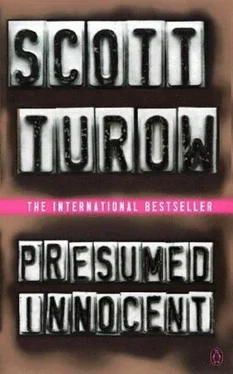Scott Turow - Presumed innocent
Здесь есть возможность читать онлайн «Scott Turow - Presumed innocent» весь текст электронной книги совершенно бесплатно (целиком полную версию без сокращений). В некоторых случаях можно слушать аудио, скачать через торрент в формате fb2 и присутствует краткое содержание. Жанр: Детектив, на английском языке. Описание произведения, (предисловие) а так же отзывы посетителей доступны на портале библиотеки ЛибКат.
- Название:Presumed innocent
- Автор:
- Жанр:
- Год:неизвестен
- ISBN:нет данных
- Рейтинг книги:4.5 / 5. Голосов: 2
-
Избранное:Добавить в избранное
- Отзывы:
-
Ваша оценка:
- 100
- 1
- 2
- 3
- 4
- 5
Presumed innocent: краткое содержание, описание и аннотация
Предлагаем к чтению аннотацию, описание, краткое содержание или предисловие (зависит от того, что написал сам автор книги «Presumed innocent»). Если вы не нашли необходимую информацию о книге — напишите в комментариях, мы постараемся отыскать её.
Presumed innocent — читать онлайн бесплатно полную книгу (весь текст) целиком
Ниже представлен текст книги, разбитый по страницам. Система сохранения места последней прочитанной страницы, позволяет с удобством читать онлайн бесплатно книгу «Presumed innocent», без необходимости каждый раз заново искать на чём Вы остановились. Поставьте закладку, и сможете в любой момент перейти на страницу, на которой закончили чтение.
Интервал:
Закладка:
"Nothin," Lip says.
"Nothing like the ropes?"
"This lady I'm talkin to tells me she read somethin like that once in a book. No one she knows of ever done it. Christ, can you imagine that's what she's readin? You'd think she gets enough on the job."
Lip has his customary OPV-official police vehicle-a gold Aries, unmarked but for the blackwall tires and the license plates, which, like those on every other OPV, begin with ZF, thus forming a code recognized by every minor hoodlum in the city. Lip guns away from the curb. Coppers, cabbies, people who live in their cars always drive so fast. He swings through one of his many shortcuts back downtown and, because of a detour, is forced onto Kinbark, main drag of my old neighborhood. The diverted traffic is thick and we move with processional slowness down the avenue. There it is, I think, there it is. His cousin Milos, who bought the bakery when my father left, never even changed the sign. It still says SABICH'S in a heavy sea-blue script. Even though I worked there every day, I remember only certain details of the interior-the summertime screen door that transfigured the moving shapes of the street, the racks of blue metal trays behind the counter, the heavy steel cash register with its round clang. When I was six, my presence was first demanded. I was a pair of hands, unemployed, and not requiring pay. I was taught to break and stack the smooth, white-sided cake boxes. I made them a dozen at a time and brought them from the cobwebbed basement to the store. Because the boxes were so slick and substantial, their edges had, at certain angles, the lacerating power of the finest cutlery; my knuckles and fingertips were often cut. I learned to dread this, for my father regarded a trace of blood on the outside of a cake box as a scandal. "Is not here a butcher shop." This remark would come with a look that mixed loathing and disgust in fearsome proportions. In my dreams of those times, it is always summer, when the air of this valley is as stilted as a swamp's, and the added dry heat of the ovens made it labor just to walk about the shop. I dream that my skin is slick with sweat, my father is calling, a cake has fallen, and my fear is like an acid that is corroding my veins and bones. If I were to paint my father, he would have a gargoyle's face and a dragon's scaled heart. The channels of his emotions were too intricately wound upon themselves, too clotted, strangulated, crowded with spite to admit any feeling for a child. There was never any question of picking sides for me. Like the apartment, its walls and pictures, the furniture he broke, it was clear that my father regarded me as a possession of my mother's. And I grew up with what seemed a simple understanding: my mother loved me; my father did not.
He took his satisfaction, if you could call so arid a feeling by that name, from opening the shop, firing the oven, raising the shade, pushing the whitened dust out the back door at the end of the day. His family had been bakers for four generations and he simply did as he had been taught. His standards were unyielding and his procedures were exact. He never tried to charm his customers; he was far too humorless and insular for that. In fact, he saw every person who entered as a potential enemy, someone who would complain, chisel, wheedle, and finally settle for day-old bread. But his income was always steady: he was known to be reliable; he distrusted employees and did the work of two, at least, himself, and he did not file a tax return for more than twenty years. He had come to this country in 1946. I was named for the town in which he had been raised, a village two hundred miles from Belgrade. Almost everyone there was a partisan. When the Nazis came through in 1941, all the adults were lined up against the schoolhouse and shot. The children were left, abandoned. My father, then barely eighteen, and soft-faced enough to have been spared, roamed with a band in the mountains for almost six months before they were captured. He spent the rest of the war in camps-first the Nazi labor camps, and the Allied DP camps after the liberation. His relatives here arranged his passage, hectoring their congressman and the congressman's local staff in a ceaseless and eccentric way. My father was one of the first of the Displaced Persons allowed to enter the United States. And after a year here, he no longer spoke to my great-aunt and my cousins who had worked so hard to save him.
Hearing the rough chorus of auto horns, I look back to make out the problem. A white man in the car behind us pounds on his steering wheel and makes a belligerent gesture in my direction, and I finally realize that Lip has stopped dead in the traffic. I take it that he has surveyed my line of sight and let the other cars move on, but when I turn to catch his expression, his eyes have shifted and he is making a determined effort to study the traffic.
"Hair and Fiber come in," Lip says finally. His gray eyes, his lined, high-cheeked face betray nothing, quiet as a pond.
"Tell me," I say, and Lip dutifully recounts the contents of the report. On Carolyn's clothes and body were minute fibers of a carpeting not found in her apartment-Zorak V is its name. It is a synthetic, milled domestically. The color is called Scottish Malt, the most popular shade. The dye lot cannot be identified and the fiber could be from either an industrial or a domestic weave. In all there are probably fifty thousand home's and offices in Kindle County from which the carpet fibers could have come. There are no hair or skin fragments in Carolyn's fingers or under her nails, confirming that there was no struggle before she was bound, and the only human hair not Carolyn's shade found anywhere near the corpse has been made as female and, thus, insignificant. The cord with which she was bound is regular clothesline, American-made, sold in every K mart, Sears, and Walgreen's.
"That didn't get us very far," I tell Lipranzer.
"Not very," he answers. "At least we know she didn't grab anybody."
"I wonder," I say. "I keep thinking about what we said last week. How maybe this was some guy she knew. I remember when I was in law school, everyone used to pass around this case about a guy whose life insurer refused to pay out. His widow was bringing the suit, which was a real stitch, because it turned out this character had bought it whacking off while he was hanging himself. Literally. Head through a noose and everything. He cashed in when he knocked over the stool he was supposed to land on."
"No shit." Lipranzer laughs out loud. "Who, won the case?"
"The insurance company, as far as I remember. The court didn't think it was a covered risk. Anyway, maybe that's what this was all about. You know, big-time kinkiness? I'm thinking that more and more. Apparently it's some weird high, coming while you're passing out."
"How does she end up dead from gettin hit?"
"Maybe her stud gets scared. Thinks he's cooled her. Figures it's John Belushi all over again, and starts to make it look like it was something else."
Lip shakes his head. He doesn't like it.
"You're stretchin," he says. "I don't think the path report supports it."
"I'm gonna run it by Painless, anyway."
This reminds Lipranzer of something else.
"Painless called me a couple days ago. Says he's got a report back from the forensic chemist. From the way he sounded, I take it we didn't get much, but maybe you can pick it up whenever you get there. I gotta get out west today. Show Mrs. Krapotnik some pictures." He closes his eyes and shimmies his head, like maybe, if he tries, he can stand the thought.
We are back downtown now. Lip eases into the first open space in the police lot, and we trek back through the noontime crowds toward the County Building. Out on the street, our spring, as so often happens, is turning fast to summer. You can feel some of the balminess that is a month or two away. It has inspired some of the ladies passing on the avenue to summer fashions, sleeveless tops, and those light, clingy fabrics of the season.
Читать дальшеИнтервал:
Закладка:
Похожие книги на «Presumed innocent»
Представляем Вашему вниманию похожие книги на «Presumed innocent» списком для выбора. Мы отобрали схожую по названию и смыслу литературу в надежде предоставить читателям больше вариантов отыскать новые, интересные, ещё непрочитанные произведения.
Обсуждение, отзывы о книге «Presumed innocent» и просто собственные мнения читателей. Оставьте ваши комментарии, напишите, что Вы думаете о произведении, его смысле или главных героях. Укажите что конкретно понравилось, а что нет, и почему Вы так считаете.












